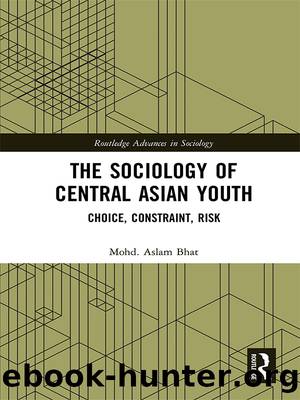The Sociology of Central Asian Youth by Mohd.Aslam Bhat

Author:Mohd.Aslam Bhat [Bhat, Mohd.Aslam]
Language: eng
Format: epub
ISBN: 9780367431808
Barnesnoble:
Publisher: Taylor & Francis
Published: 2020-01-14T00:00:00+00:00
Given their exposure to the liberal democratic values and American culture at large, FLEX alumni on returning to their native countries are expected to teach and share their experiences with their peers. In this connection, the FLEX alumni of Uzbekistan have come up with some social awareness and counselling programmes like prevention of drug abuse, human trafficking, etc. (OSINFO, 2005). However, given the broader politico-cultural setup of the country, these alumni do not merely find themselves in severe cultural shock, but rather are implemented to justify and legitimate the discursive thrall of the prevailing system. In fact, every youth in Uzbekistan who gets an opportunity or is provided with a scholarship, funding or loan, etc., is expected and at times pushed to speak the authoritarian language of the country. That is to say that these young people are not allowed to hold any independent opinion contrary to the prevailing dominant opinion of the system.
The âUmid fundâ has been one such example â a Presidential Scholarship Programme established in 1997 by the Uzbek government to support the education abroad of talented youth. Upon accomplishment of their studies, these alumni were contractually obligated to work five years for the government and share their expertise with their peers. If they failed to fulfil their contract, their families faced possible prosecution or the loss of their homes. However, after the foundation stopped its activities, a large number of alumni immediately returned to the countries where they had studied (Zayaeva, 2006).
Still this is not the only case concerning these ambitious Uzbek youth. Looking through the lens of their anticipation, this youth category of Uzbekistan is most diverse and vibrant, and includes young people across the country. Among them one meets youth who want to become devout Muslims, but due to repressive religious policies (see Zanca, 2005) and cynical surroundings, they prefer to keep silent. Some pretend to be patriotic, politically interested and believe in national ideology, as Nelofar, a BA student from Tashkent told me:
Why should we think about liberal democracy? Isnât China a non-democratic country, isnât their power structure centralised? How could they emerge as a world power? In that way we [Uzbekistan] can also be like China in our future. Weâve no need of others suggestions.
Download
This site does not store any files on its server. We only index and link to content provided by other sites. Please contact the content providers to delete copyright contents if any and email us, we'll remove relevant links or contents immediately.
| Early Childhood | Parenting Boys |
| Parenting Girls | School-Age Children |
| Single Parents | Teenagers |
The Lost Art of Listening by Michael P. Nichols(7494)
Rich Dad Poor Dad by Robert T. Kiyosaki(6612)
We Need to Talk by Celeste Headlee(5608)
I Love You But I Don't Trust You by Mira Kirshenbaum(3865)
The Complete Idiot's Guide to Coping With Difficult People by Arlene Uhl(3145)
Rich Dad Poor Dad: What The Rich Teach Their Kids About Money - That The Poor And Middle Class Do Not! by Robert T. Kiyosaki(2949)
A Burst of Light by Audre Lorde(2597)
The Book You Wish Your Parents Had Read (and Your Children Will Be Glad That You Did) by Philippa Perry(2509)
Dealing with People You Can't Stand by Dr. Rick Brinkman(2458)
Life Hacks by Dan Marshall(2448)
An Odyssey by Daniel Mendelsohn(2305)
The Expectant Father by Armin A. Brott & Jennifer Ash(2269)
Teach Your Child How to Think by Edward De Bono(2155)
No Time to Say Goodbye(2112)
What I Need by J. Daniels(2075)
The 7 Habits Of Highly Effective Teens by Covey Sean(2075)
The Out-of-Sync Child by Carol Stock Kranowitz(2049)
The Anxious Generation by Jonathan Haidt(2017)
I Don't Belong to You by Keke Palmer(1993)
